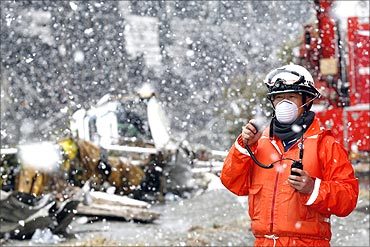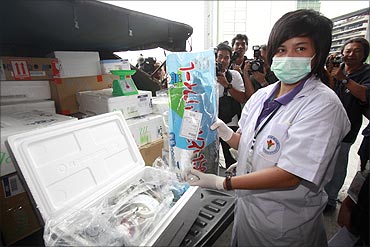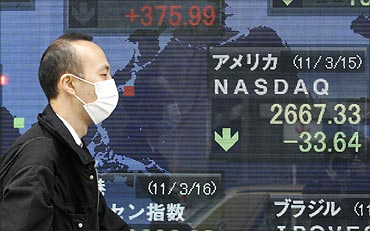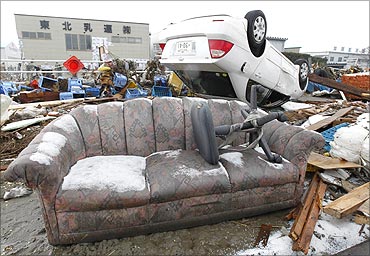 | « Back to article | Print this article |
Japan: Factories remain shut, price hike likely
Click NEXT to read on
Japan: Factories remain shut, price hike likely
Japan accounts for 20 per cent of world's semiconductor production. As automobile, electronics and semi conductor factories remain closed, the global supply chain will get affected.
Many companies outside Japan which are dependent on component supplies will be in trouble.
The prices of electronics devices is likely to rise as companies like Toshiba, Fujitsu, Canon, Nikon and Texas Instruments will take time to restore operations.
Several automobile industries in Europe and Asia import components from Japan. An indefinite delay is likely to hit production adversely.
Click NEXT to read on
Japan: Factories remain shut, price hike likely
Japan has started power cuts nationwide as 30 per cent of its energy is sourced from nuclear power.
With the nuclear power production at a standstill, even Tokyo is experiencing blackouts.
The power cuts will continue till the end of April. These power cuts are not according to any schedule, resulting in inconvenience at homes, and public places.
Click NEXT to read on
Japan: Factories remain shut, price hike likely
Food items imported from Japan to India will be tested for radiation as there are fears of contaminations from radioactive materials from Japan's damaged nuclear power plant.
The Food Safety and Standards Authority of India at Indian ports, airports have been asked to get food originating from Japan after March 11 to be tested for radiation.
The radioactive material can lead to the contamination of the entire eco system damaging crops, marine life and even drinking water.
Click NEXT to read on
Japan: Factories remain shut, price hike likely
After Indian IT companies, TCS, Wipro, Infosys and L&T Infotech took steps to ensure their employees return home safely, China is helping its citizens move from Japan.
Air India is operating flights to Japan. Australian airlines Qantas and Jetstar also plans to restart service.
Virgin Atlantic, South Korean airlines and British Airways will fly as per the schedule. Air China cancelled some flights and said will monitor the situation and make necessary changes.
Other airlines like Air New Zealand and Singapore Airlines are operating normal services.
Click NEXT to read on
Japan: Factories remain shut, price hike likely
Apple Inc is delaying the launch of its new iPad 2 in Japan in the wake of the devastating earthquake and tsunami in the country. The iPad 2, which was launched by company chief Steve Jobs in the US on March 2, was scheduled to hit Japan on March 25.
"We are delaying the launch of iPad 2 in Japan, while the country and our teams focus on recovering from the recent disaster," said Apple spokesperson Natalie Kerris.
Apple had said it will begin selling its latest tablet computer in 26 other countries, including Mexico, New Zealand and Spain, on March 25.
The California-based technology giant has not yet set new launch date for the tablet in Japan, which now also faces risk of nuclear radiation leak after a series of blasts at its nuclear plant at Fukushima.
"Our hearts go out to the people in Japan, including our employees and their families, who have been impacted by this tragedy," Kerris added.
The company spokesperson said Apple's facilities and retail locations were open and functioning, with the exception of one store in Sendai Ichibancho.
Click NEXT to read on
Japan: Factories remain shut, price hike likely
Analysts said the disaster in Japan is expected to have minimal impact on Apple's current-quarter revenue.
In a report on the impact of the Japan disaster on Apple, Minneapolis-based investment firm Piper Jaffray said Japan constituted 5.4 per cent of overall Apple revenue in the December 2010 quarter.
Piper analysts predict that the crisis in Japan will impact Apple March quarter revenue by less than one per cent, which means a decrease of approximately $202 million.
In a worst case scenario, where there were absolutely no iPad 2 sales in Japan in the first half of the June quarter, Apple revenue would decrease by only 2.7 per cent or $563 million.
Apple's sales in Japan accounted for about $4 billion or 6.1 per cent of its total revenue last year. Jobs had appeared from his medical leave to launch the iPad 2, that hit retail outlets in the US on March 11. According to the analyst estimates, Apple has sold 500,000-1 million iPad 2 units over the opening weekend.
Japan: Factories remain shut, price hike likely
The Chairman of the Prime Minister's Economic Advisory Council, C Rangarajan, on Tuesday said the ongoing crisis in Japan would have an impact on investment route and trade.
"The impact will be somewhat indirect. To some extent, Japanese investment in India will be affected because there will be so much of demand for investment within the country and there will be very little available to invest outside," said Rangarajan.
"So that would be warning fact. And the other is impact on trade, which may perhaps weaken our exports to Japan, but the impact that I see, it is only to the investment route," he added.
Market analysts said the investors are unsure about the outcome of the Japan crisis, and found it difficult to ascertain the negative impact on Indian markets.
"Unfortunately, this earthquake in Japan has again sent the market where investors are not sure about the outcome of this earthquake, meaning how much the economy, the global economy will have impact of this earthquake in Japan," said Sunil Shah, an analyst.
"Japan is the third largest economy and if things come to a grinding halt, then what would be the overall impacts; so it's very difficult to ascertain or assess how much negative impact this earthquake can have," he added.
ANI








